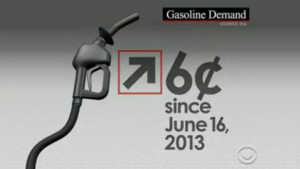Iraq and Your Gas Tank

When it comes to US foreign policy and warmaking in the Middle East, you’re not supposed to talk about oil. To suggest it plays a serious role in US decision-making is to invite taunting about conspiracy theories.
But sometimes reporters give themselves a break, like CNN host Wolf Blitzer on June 18:
As terrorists target Iraq’s biggest refinery, is it time for the US to act?
This three days after ISIS militants reportedly claimed to have massacred 1,700 Iraqi government soldiers based on their religion. Good to know that CNN has its priorities straight.
The network newscasts were taking a different approach: Iraq was making your next trip to the gas station more expensive. On ABC World News (6/18/14), anchor David Muir announced: “Tonight, new numbers, new gas prices and economists say Iraq is to blame.” Correspondent Cecilia Vega indeed could point to a small increase in prices, but it wasn’t clear why this had anything to do with Iraq, other than they say it must:
The national average for a gallon of gas, now $3.67. Some analysts say drivers should expect to pay as much as 5 cents a gallon more, David. All because of these fears over what’s happening in Iraq.
But it wasn’t just ABC. On the CBS Evening News (6/18/14), viewers were told that “the crisis in Iraq is driving oil prices higher.” Correspondent Anna Werner took it from there, explaining that a gallon of gas is “already six cents higher than a year ago.”
But the math was hard to parse. Werner explained that “the cost of crude accounts for 65 percent of the price of gasoline at the pump,” which might make it harder to pin a small price increase on the turmoil in Iraq.And it didn’t help that Werner pointed out that “just 4 percent of US oil imports come from Iraq.”
Her report was committed to its conclusion, though, going so far as to find a moving company that is curtailing plans to buy new trucks due to this crippling six-cent increase. CBS also offered a graphic of crude oil prices to dramatize–or distort–this new reality:
It’s neat how the CBS graphics department was able to make a 5 percent price increase look like Yosemite’s El Capitan.
And Werner found other ways to pump up the impact:
The six-cent increase in the cost of a gallon of gas has pulled $163 million a week out of the pockets of American consumers and businesses. That’s money that could be helping to move the economy forward.
Of course, oil companies are always “pulling money” out of Americans’ pockets, amounting to hundreds of billions of dollars every year. But somehow corporate profit announcements are not usually reported this way.
There are some more cautious experts. “Be prepared for a price hike next week,” Patrick DeHaan of GasBuddy told WILX (6/19/14). “But it has nothing to do with Iraq at this point.” Other outlets have already made up their minds, even if they don’t exactly have the evidence.


